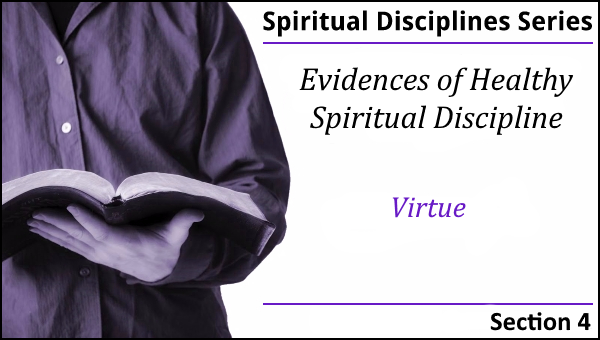By Tyson Thorne

We’ve just finished a series on 12 disciplines of the Christian faith – four are community disciplines, four are private, and another four are simply personal. The Christian practicing these disciplines can expect certain benefits of character as a result. This is by no means exhaustive, and is in addition to a more dynamic and special relationship with God. The first (of four) is “virtue”, which means “moral excellence”. If that is still too vague, it is less about moral philosophy and more about right conduct. Virtue, then, is doing what is right even when you don’t want to.
To put it another way, “virtue, unlike innocence, has successfully passed a point of temptation.” I can’t remember where I heard that, but I like it and it helps define virtue as both an action and an act of will. Do you feel ineffective and unproductive in your relationship with God? Then you need to understand and practice a virtuous lifestyle. At least that is what Peter tells us in his second epistle:
I can pray this because his divine power has bestowed on us everything necessary for life and godliness through the rich knowledge of the one who called us by his own glory and virtue. Through these things he has bestowed on us his precious and most magnificent promises, so that by means of what was promised you may become partakers of the divine nature, after escaping the worldly corruption that is produced by evil desire. For this very reason, make every effort to add to your faith virtue, to virtue, knowledge; to knowledge, self-control; to self-control, perseverance; to perseverance, godliness; to godliness, brotherly affection; to brotherly affection, unselfish love. For if these things are really yours and are continually increasing, they will keep you from becoming ineffective and unproductive in your pursuit of knowing our Lord Jesus Christ more intimately.
Many translations use the word “excellence” instead of virtue, but the Greek word used in each of these instances is aretay, which is the word for virtue or moral excellence. More importantly, examine what we learn about virtue from these few verses. First, God is virtuous. By pursuing virtue we become more like God (or as Peter puts it, partakers of the divine nature). Second, it is expected for those of faith to be virtuous. It is the first thing that believers are to develop once they have placed their trust in Jesus.
Virtue has always been recognized as a most important character trait for the godly. In the apocryphal work, The Book of Wisdom, recognized by Jewish leaders as an important (though not sacred) work, it is stated, “Better to have no children yet to have virtue, since immortality perpetuates its memory; for God and human beings both recognize it,” chapter 4 verse 1. The book is attributed to Solomon as sayings of Wisdom, much like Proverbs, but was probably written in about 50 B.C. It contains a series of teachings that, while not inspired like the rest of Scripture, probably have a long tradition in Jewish teachings.
As a follower of Jesus, then, we are to live a life of virtue – that is to say of moral and ethical excellence. Examine your heart. How often do we think of being virtuous, much less pursue it? By making virtue a priority we draw nearer to God and take of an important part of his character, making it our own. This is part of what we can expect when we practice the 12 disciplines.
|
|